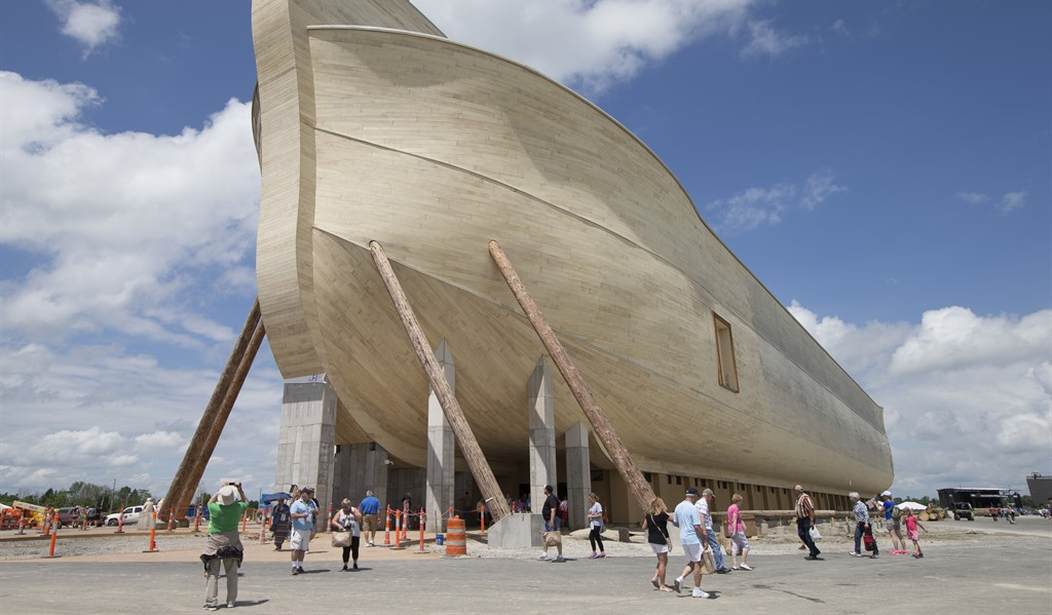As someone who once aspired to the ministry and remains interested in matters of faith and religion, I was rather tickled to see that Noah’s Ark had once again been discovered. I am a columnist, and in a recent survey of the daily doom-scroll, I ran across the headline: “Archaeologists discover boat-shaped mound that could be NOAH’S ARK in Turkish ruins.” My fellow writers have often dismissed the website offering the story as sketchy, but bless my soul, the armchair religious scholar in me could not help but click on it. Why? For the same reason that people indulged in “Ancient Aliens” or why I used to faithfully settle into my easy chair and tune in to “MonsterQuest” every week. I was not expecting to be edified but entertained for an hour. Think of it as mental Twinkies. No nutritional value, but plenty of fun. I was not disappointed to learn that archeologists had found a mound containing "clayey and marine materials and seafood." I suppose the mound could be the ruins of Noah’s Ark. It could also be the remains of an ancient Turkish food truck.
The discovery of Noah’s Ark makes the lower-tier headlines now and then. There was also the story of the man who claimed he had found the remains of Sodom and Gomorrah based on some sulfur deposits. In that documentary, the gentleman proceeded to point to every geological and topographical feature in the area and declare that they were the former Sodom city offices, brew pub, and strip mall. Just as some may be quick to declare the mound to be proof of biblical accuracy, others are equally quick to remind us that the Mesopotamian “Epic of Gilgamesh” contains a very similar story of a great flood and predates the Genesis account by centuries. So, who came first? Utnapishtim or Noah? The truth is that it doesn’t matter. Before you start gathering kindling and locating a stake, allow me to explain.
The writer of Genesis and those of the mythologies of the rest of the Ancient Near East held very different worldviews. In many of the contemporary cultures, the creation of the universe was brought about by an act of violence, such as the slaying of the dragon Tiamat. Humans were created as byproducts of bodily fluids like blood, sweat, or semen. Or, if people were purposely created, their job was to do the tasks that lower gods felt were beneath them. In one case, humans are created to dig irrigation ditches. The gods themselves may have been supernatural, but their whims, attitudes, appetites, and behaviors were the same as any human’s and were often greatly magnified. The universe, humanity, and the gods that controlled both were essentially products or agents of lust, anger, hunger, and greed.
By contrast, in Genesis, God chooses to bring order out of chaos. The universe is planned, and its construction is intricately executed. Far from being an accident or designated for scut work, humanity is carefully drawn first from the soil and then from one another. And the creation and union of the first humans is considered by God to be “very good.” Calamity ensues when these people void the social contact with God and give in to their desires, much in the same way as the other gods of the Ancient Near East. In “The Epic of Gilgamesh,” Utnapishtim arrives very late to the action in the story. He tells Gilgamesh the story of how the gods decided to destroy humanity for basically being too loud and a source of irritation, much like neighbors throwing a wild house party with the stereo’s bass keeping you awake until the wee hours. In Genesis, God chooses to flood the world because humanity has continued to violate the social contract with a vengeance. People are no longer in a relationship with God and, by extension, one another. The chaos God sought to quell with the creation of the world has been recreated.
In the end, it does not matter which story came first. They are two different stories. “The Epic of Gilgamesh” would have us shrug our shoulders and say, “Well, after all, it is what it is. Whaddya gonna do?" The Genesis accounts of Creation and the Flood call us to examine our lives and our relationships to a transcendent God and each other. These Genesis stories remind us of the social contract that was established when God laid the foundations of the Earth and of our inability to hold up our end of the bargain. And so we should not be too taken aback when Hamas terrorists overrun the borders of Israel to rape, kill, maim, and kidnap, anti-Semitism again rears its head across the globe, Ohio votes to uphold abortion policies, or even when Megan Rapinoe opines that her recent injury is proof that there is no God. These things only point to the actual truth of Genesis, no matter the age of the earth or the presence or absence of an ark.










Join the conversation as a VIP Member